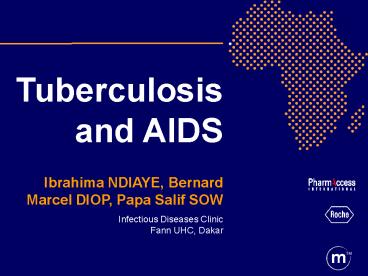Tuberculose et SIDA - PowerPoint PPT Presentation
1 / 21
Title:
Tuberculose et SIDA
Description:
Tuberculosis and AIDS Ibrahima NDIAYE, Bernard Marcel DIOP, Papa Salif SOW Infectious Diseases Clinic Fann UHC, Dakar TM Introduction Characteristics of tuberculosis ... – PowerPoint PPT presentation
Number of Views:296
Avg rating:3.0/5.0
Title: Tuberculose et SIDA
1
Tuberculosis and AIDS
Ibrahima NDIAYE, Bernard Marcel DIOP, Papa Salif
SOW Infectious Diseases ClinicFann UHC, Dakar
2
Introduction
- Characteristics of tuberculosis and AIDS
- Very frequent opportunistic infection
- Interactions with the two endemic diseases
- Risk of nosocomial transmission
- Non stereotypical clinical manifestations
- Drug interactions with ARV
- Problem of tuberculosis prophylaxis
- Association of tuberculosis and aids challenge
3
Introduction
- HIV factor which is currently causing an
increase in TB - Direct route with PWHIV
- Indirect increase in transmission
- Year 2000 1 case of TB/7 were attributed to HIV
- TB Incidence 143 to 163/100.000 (90 - 00)
- HIV upsurge in multiresistant cases
- The problem immunity deficit
- Vulnerability of PWHIV Tuberculosis
4
Natural HIV history Role of TB
5
PWHIV Tuberculosisprevalance AIDS 2001
- Rwanda 41
- Burundi 49
- Ivory Coast 61
- Tanzania 65
- Ethiopia 42
- Burkina Faso 46
6
Opportunistic Infections (n 1095, Mal.Infect.
Dakar)
- Tuberculosis 318 37.9
- Bact.et parasit.diarrohea 268 32
- Pneumopathy 171 20.5
- Bacteriaemia 44 5.2
- Purulent meningitis 18 2.1
- Kaposis sarcoma 9 1.1
- Cryptococcus meningitis 7 0.8
- Cerebral toxoplasmosis 3 0.4
7
Infectious pnemopathyResearch project ANRS -
Senegal
- 589 patients recruited (Fann and HPD)
- Tuberculosis 1st HIV and HIV- infection
- Bacterial pneumopathy (HIV vs HIV-)
- Low pneumocystosis prevalence
- Strong HIV pneumo.bacterial lethality
- Need for a prophylaxis for these O.I.
8
Clinical characteristics
- HIV patient with CD4 gt 200
- Non specific clinical signs
- Mainly pulmonary localisations
- HIV patient with CD4 lt 200
- Disseminated forms of the disease ganglionic,
meningitis, hepatic - Positive haemoculture
9
(No Transcript)
10
Radiographic appearances
- Uni or bilateral infiltrates, localised /-
- Alveolar focus /- systematised
- Miliary bronchogenes
- Caverns on tops of lungs (rarely)
- Hilar or mediastinal adenopathy
- Normal chest image (AFB )
11
Paraclinical diagnosis
- Positive IDR tuberculin test 30
- AFB sputum ve in 40 to 50
- Other respiratory samples
- Gastric tubages
- Broncho-alveolar lavage
- Fibro-aspiration
- Biopsy (positive liver biopsy in 40)
- Significance of culture expectorations
- Amplification of chain polymerisation
12
Risk factors for negative sputum acid-fast
bacilli smears in pulmonary tuberculosis results
from Dakar, Senegal, a city with low HIV
seroprevalence
- B.Samb, P.S.Sow, S.Kony, M.Maynart, G.Diouf, S.
- Cissokho, M.Sané, A.A.Hane, F.Klotz et al.
- Int J Tuberc Lung Dis 1999 3 (4) 330 - 336
13
Tuberculosis and HIV infection
- HIV Tuberculosis predictive factors
- Buccal candiasis
- A low level of CD4
- Cutaneous anergy
- Negative bacilloscopy is more frequent in HIV
- Different radiological images in HIV vs HIV-
14
Tuberculosis and HIV infections
- Frequent opacity and caverns in HIV-
- Mediastinal adenopathy HIV
- Tuberculosis is immunosuppressive and accelerates
the progression of HIV infection
15
Treatment strategies
- Sensitivity to classic antituberculosis agents
- But
- Problematic multiresistant forms
- Alternative strategies fluoroquinolones
- Interaction with antiprotease and non nucleosidic
inhibitors - Reduction of bioavailability with Rifampicin
16
Tuberculosis and HIV/AIDS
- Negative Bacilloscopy
- HIV Tuberculosis 14/40 (35.0)
- HIV - Tuberculosis 71/410 (17.3)
- HIV versus HIV- 35.0 vs 17.3 RR
2.02 1.26-3.24, P 0.01. - Multivariate analysis
17
Antiretroviral treatment and Tuberculosis
- Three treatment strategies proposed
- Delay ARV treatment until the end of
antituberculosis treatment - Immediate treatment with 2 NRTI 1 NNRTI
(efavirenz 800 mg if rifampicin) or with3 NRTI - Delay ARV treatment by 2 months at time of change
to maintenance treatment and use Isoniazide
Ethambutol
18
Recommendations
- Individual specific decision
- WHO/CD4
- Combined treatment CD4lt 50
- Delay ARV treatment by 2 months 50lt CD4lt 200
- TB treatment then ARV treatment CD4gt 200
19
Chemoprophylaxis arguments
- TB is a first opportunistic infection
- Tuberculosis accelerates HIV progression
- Increase in TB incidence due to HIV
- Prophylaxis with Isoniazide for 1 year
- Reduction in TB risk by a factor of 2 to 4
- Reduction in TB risk by 27 over 5 year follow-up
20
TB and HIV chemoprophylaxis
- HIV patient IDR tuberculin test gt 10 mm
- Isoniazide for 12 months
- Isoniazide 2 times/week 9 months
- Rifampicin Pyrazinamide for 2 months
- Pyrazinamide Rifabutin for 2 months
- Isoniaside Rifampicin Pyra 3 months
- Senegal no recommendations
21
Conclusion
- HIV pandemic aggravates TB situation
- Morbidity and mortality linked to CD4 deficit
- Need for NPFA and NPT to collaborate
- Best combined treatment strategies of ARV and
antituberculosis agents must be better defined































